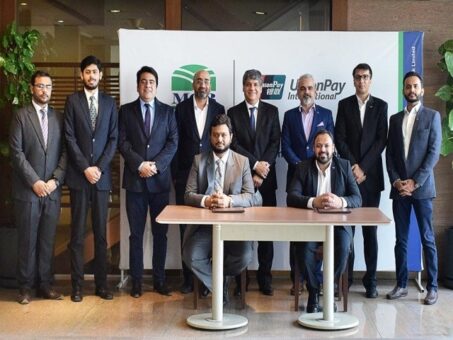LAHORE: MCB Bank Limited has entered into an agreement with UnionPay International (UPI) to further facilitate e-Commerce businesses partnered with MCB e-Gate with access to UnionPay International’s globally recognized payment services.
Under this agreement, MCB Bank will be enabling partner eCommerce businesses to access UnionPay International as a payment scheme in the MCB eGate internet payment gateway service. Going forward,all eCommerce businesses that utilize the MCB eGate service will be able to receive patronage from UnionPay International Debit and Credit Cardholders who will now be able to conduct online payment transactions on their platforms.
The agreement was signed between Muhammad Azam Naeem, Business Head, Digital Banking, MCB Bank and Nadeem Haroon, Country Manager, UnionPay Pakistan at MCB House, Lahore. Shahzad Ishaq, Group Head, Consumer & Digital Banking, MCB Bank, Jasim Ahmed Waheed, Department Head Acceptance, Digital Banking, MCB Bank, Umer Qasim, Product Manager eCommerce and Payment Gateway, Digital Banking, MCB Bank, Kashif Ali, Ali Abbas and Mehtab Haider from UnionPay International were also present at the ceremony.
Speaking at the occasion, Shahzad Ishaq said: “at the heart of all our digital initiatives is enhancing customers’ access to payments, convenience and ease of doing transactions. Simultaneously, we would enrich the value proposition provided to Bank’s eCommerce merchants.
“Through our agreement with UnionPay International, our partnering eCommerce merchants stand to benefit from the potential business with over 12 million UnionPay cardholders in Pakistan.”
James Yang, General Manager UnionPay International Middle East, also added: “UnionPay has the world’s largest cardholder base issued across 70 countries and regions. Providing security and effortless convenience for all of our customers is key when looking to the future. Supporting both merchants and consumers, UnionPay International invests significantly in technology and innovation to deliver a range of leading products, all adhering to the highest standards of security and protection.”
MCB Bank is one of the largest and most innovative banks in Pakistan. The Bank operates a strong and vast network of Over 1,400 branches and over 1400 ATMs in Pakistan and 11 overseas branches. With a customer base of over 7 million, MCB leads the banking & financial services sector in Pakistan and customers across the globe have 24/7 access to MCB Bank via our innovative and accessible Digital Banking Services.
UnionPay International (UPI) is a subsidiary of China UnionPay focused on the growth and support of UnionPay’s global business. In partnership with more than 2400 institutions worldwide, UnionPay International has enabled card acceptance in 180 countries and regions with issuance in 70 countries and regions. UnionPay International provides high-quality, cost-effective and secure cross-border payment services to the world’s largest cardholder base and ensures convenient local services to a growing number of global UnionPay cardholders and merchants.






